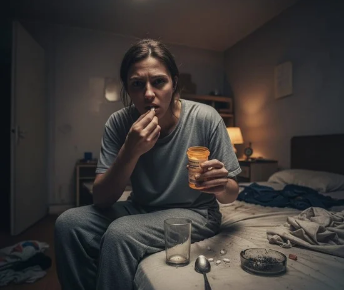Benzodiazepine Addiction: Understanding Dependence, Risks, and Recovery in the UK and Middle East
Benzodiazepine addiction is a growing but often hidden problem in the UK and Middle East. These medications are prescribed to treat anxiety, insomnia, and panic attacks, and they work well for short-term relief by calming the nervous system. However, prolonged use or taking higher doses than prescribed can lead to physical and psychological dependence, meaning the brain relies on the drug to function normally and users feel they cannot cope without it.
Treating this addiction is particularly challenging because withdrawal can be severe and unpredictable, causing anxiety, insomnia, seizures, or even benzodiazepine withdrawal psychosis, which makes professional supervision essential. The complexity arises not just from the drug’s effects but also from patterns of use, social stigma, regulatory gaps, and healthcare limitations in these regions. Understanding all these factors is crucial to tackling benzo addiction effectively, highlighting why recovery requires a careful, structured, and compassionate approach rather than relying on willpower alone.
Signs of Benzodiazepine Addiction in the UK and Middle East
Recognizing signs of benzodiazepine addiction early is critical because early intervention greatly increases the chances of successful addiction treatment. Addiction often starts subtly, making it easy to overlook until dependence has developed.
- Increasing dosage: Taking higher doses than prescribed to achieve the same calming effect.
- Emotional reliance: Feeling unable to cope with daily life without medication.
- Cravings: Intense urges to take the drug despite awareness of harm.
- Neglecting responsibilities: Work, family, and social commitments begin to suffer.
- Withdrawal symptoms: Anxiety, insomnia, or irritability when attempting to stop.
These signs are often accompanied by benzodiazepine side effects like drowsiness, mental fog, or memory loss. Many users continue despite discomfort because the withdrawal symptoms are frightening. In severe cases, abrupt cessation can trigger benzodiazepine withdrawal psychosis, underscoring the importance of professional support and structured benzodiazepine addiction rehab.
Why Is Benzodiazepine Addiction Hard to Treat?
Benzodiazepine dependence poses unique challenges for healthcare providers in both the UK and the Middle East. Below are some of the key reasons why recovery can be complex:
1. Physical Dependence Makes Detox Dangerous
Benzodiazepines affect neurotransmitters like GABA. Over time, the brain reduces natural GABA production, relying on the drug to maintain calm. Abruptly stopping can trigger withdrawal symptoms including seizures, insomnia, and anxiety. Safe detox requires medical supervision and gradual tapering.
2. Co-Existing Mental Health Conditions
Many users began using benzodiazepines for anxiety, depression, or insomnia. When attempting to quit, these symptoms can return, making relapse likely. In regions with mental health stigma, like parts of the Middle East, individuals often avoid therapy and self-medicate instead.
3. Lack of Awareness About Addiction Risks
Patients often assume prescribed drugs are safe. In the UK, long-term prescriptions still occur despite monitoring systems. In the Middle East, loose regulation allows easier access, increasing the risk of benzodiazepine addiction.
4. Psychological Dependence
Even after detox, users may fear the return of anxiety or insomnia. This mental dependency can persist for months, requiring cognitive behavioral therapy (CBT) and emotional support to prevent relapse.
5. Social and Cultural Factors
In some Middle Eastern cultures, addiction is deeply stigmatized, leading families to hide the issue. In the UK, long NHS waiting lists for therapy can delay recovery. Both scenarios make consistent rehab support difficult.
Benzodiazepine Side Effects and Their Role in Addiction
The side effects of benzodiazepines can worsen dependence and make recovery harder. Recognizing them early can help identify when use is turning into addiction.
- Drowsiness and Fatigue: The drug slows the central nervous system, causing persistent tiredness and reduced motivation.
- Poor Coordination and Dizziness: Impaired motor control increases the risk of falls, especially in older adults.
- Memory Impairment: Users may forget conversations or doses, leading to confusion and denial of addiction.
- Mood Swings: Irritability, low mood, or paradoxical anxiety are common with prolonged use.
- Long-Term Cognitive Decline: Chronic use alters brain chemistry, leading to emotional instability and slow recovery even after detox.
Why Early Intervention for Benzodiazepine Addiction Recovery Matters
Recognizing the signs of addiction early allows for a safer and more successful recovery. The longer benzodiazepines are used, the stronger the dependence and the more difficult the withdrawal.
Families and caregivers play a vital role by noticing subtle changes like persistent drowsiness, mood swings, or increasing doses. Early treatment prevents dangerous benzodiazepine withdrawal symptoms and allows time to address underlying anxiety or depression before relapse occurs.
Conclusion
Benzodiazepine addiction is a complex issue shaped by both biological dependence and psychological need. The drug’s side effects — including drowsiness, confusion, and emotional instability — reinforce the cycle of use and withdrawal. In the UK and Middle East, stigma, lack of awareness, and limited access to specialized care make recovery even more challenging.
However, recovery is possible. With professional guidance, structured detox, and compassionate therapy, individuals can break free from dependence and restore balance to their lives. Early intervention, understanding, and medical supervision remain the keys to long-term recovery.
Frequently Asked Questions
1. Why won’t my doctor prescribe diazepam in the UK?
Doctors are cautious because benzodiazepines carry high addiction risks. They are reserved for short-term use under close supervision.
2. Which country uses the most benzodiazepines?
Developed countries, including the US and parts of Europe, report the highest use, leading to widespread benzo addiction issues.
3. Do they prescribe benzodiazepines in the UK?
Yes, but prescriptions are tightly controlled and limited to prevent benzodiazepine dependence.
4. Why do doctors dislike prescribing benzodiazepines?
Due to severe benzodiazepine side effects and withdrawal risks, long-term use is avoided. The goal is to protect patients from dependency and promote sustainable recovery.
























 Yes, many offer serene environments and solid therapeutic frameworks. However, quality varies, so it’s essential to research accreditation, staff credentials, and therapeutic depth.
Yes, many offer serene environments and solid therapeutic frameworks. However, quality varies, so it’s essential to research accreditation, staff credentials, and therapeutic depth.




